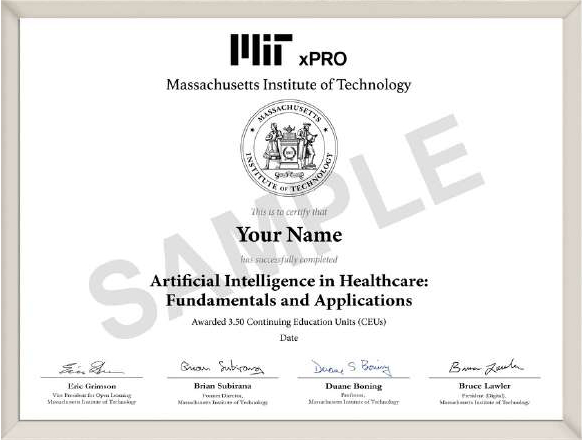ARTIFICIAL INTELLIGENCE IN HEALTHCARE: FUNDAMENTALS AND APPLICATIONS
Harness the power of AI to elevate modern-day medical treatments

Overview
The applications of artificial intelligence (AI) in healthcare are as diverse as drug discovery and patient self-care. This industry is projected to be a USD 200+ billion industry by the year 2030 and will be responsible for generating approximately 2.3 million new positions related to analytics, management, and augmented decision-making.
The MIT xPRO AI in Healthcare program is designed specifically to help you fill that need gap. This 7-week program, designed by expert MIT faculty, will help you gain a comprehensive overview of the technologies and their possibilities. It will elaborate on the design processes of AI products and help you create applications for healthcare professionals as well as patient care.
Through this program, you will gain an in-depth understanding of technologies such as machine learning, neural networks and natural language processing (NLP), and deep learning. The bite-sized learning modules backed with real life case studies and research papers will help you envision real-world applications, enhance your skill set, and add value to your organization.
USD
2,600
7 weeks
5–7 hours per week
USD 150 billion in savings annually
The total projected savings for all Americans owing to AI-related healthcare solutions by 2026
Source: Healthcare Weekly
The content of this program assumes previous knowledge of calculus, linear algebra, statistics, and probability. Basic Python experience will also be beneficial.

Program Highlights
Learn real-world application simulation by creating an AI decision framework relevant to healthcare
Gain an understanding of concepts and technologies such as machine learning and deep learning, neural networks and NLP, and biomechatronics
Acquire insights and examples from expert MIT faculty
Develop your ability to assess challenges, opportunities, and future-driven patient care solutions involving a variety of AI technologies
Earn a certificate and four continuing education units (CEUs) from MIT xPRO
Services Offered by Emeritus
Live weekly office hours with learning facilitators
Personalized feedback, support, and network development
Who Is This Program For?
who are driving technology adoption in their organizations and are looking to add AI products and services to their arsenal and those seeking to improve existing products or create new products that elevate patient care


who are leading their organizations into the field of AI technologies and searching for the right AI solutions to impact millions of lives
who are seeking to sharpen their understanding of AI products and methodologies to advance patient care


who are responsible for shaping organizations' AI strategies and are therefore looking to upgrade their knowledge about new technologies that are changing the healthcare system
Key Takeaways
This program is designed to equip you with the skills to broaden your understanding of the applications of AI-based technologies in healthcare. The program will help you to:
Build a Foundation
Apply Your Skills
Execute
Program Schedule
The 7-week AI in Healthcare program offered by MIT xPRO is designed to help you to:
Module 1: The Stages of Designing an AI Product
The introductory module focuses on the basic structure of AI product design. You will learn the four stages of designing an AI product and identify desired AI behavior, business and technical requirements, value, and a software development plan. This module will also teach you how to:
Module 2: The Fundamentals and Applications of Machine Learning
The second module is a deep dive into a key AI technology: machine learning. In addition to introducing you to various gorithms, classifiers, decision trees, and more, it will also demonstrate how to:
Module 3: The Fundamentals and Applications of Deep Learning
The third module covers deep learning, including the length and breadth of neural networks and applications such as drug discovery and cancer cure research. In addition, this module reveals how to:
Module 4: Designing Artificial Machines to Solve Healthcare Problems
From this module onward, you will add implementation to theory. In Module 4, you will acquire a 360-degree approach to design that covers everything from setting superhuman targets to software methodologies, tool development, research, ethical responsibilities, and possible challenges to these machines. In addition, you will learn how to:
Module 5: The Peloton Framework
Here, you will immerse yourself — from complete macro and micro perspectives — in the important Peloton framework, which has helped facilitate modern ingestible robots. Furthermore, you will learn how to:
Module 6: Developments in Biomechatronics With AI
This module covers the world of advanced prosthetics, proprioception, and exoskeletons. Besides getting an in- depth understanding of the history, research, developments, and current shortcomings of these areas of innovation, you will also learn how to:
Module 6: Developments in Biomechatronics With AI
The final module of the program discusses the immediate challenges and possibilities in the field of healthcare technologies. These include business applications, maintenance challenges, various sources of inspiration, and the potentials of electromagnetic waves and using radio-frequency identification (RFID) chips. In addition, you will learn how to:
Learning Activities

Discussion boards

Quizzes

Try-It activities

Jupyter Notebook exercises

Decide-It activities

Crowdsource activities

Drag-and-Drop activities
Assignments and Projects

Creative problem-solving
Ideating an ingestible robot
Resolving a communication problem when using prosthetics

Analysis-based assignments
Business and technical requirements for
AI AI cancers

Try-It activities
Hypothesizing an AI product for healthcare
Case Studies and Research
Elazer Edelman
Generative Adversarial Networks (GANs)
Through this research, identify how to generate realistic-looking images of the heart that can be instrumental for cardiologists in diagnosis and treatment.
Manolis Kellis
AI To Identify Genetic Predisposition to Diseases
From this research, learn about GENCODE, the project that attempts to create an encyclopedia of genes and genetic variants.
James Collins, Tommi Jaakkola, and Regina Barzilay
Graph Neural Networks (GNNs)
This research contains a useful tool for antibiotic discovery that can aid you in your own drug discovery.
Regina Barzilay
Mammograms for Early Diagnosis of Breast Cancer in Women
Through this research, learn how to use an image-based deep learning model that can predict breast cancer up to five years in advance.
Hugh Herr
Developing Bionic Parts Using AI
From this research, learn how to create bionic limbs that emulate the function of natural limbs.
Dina Katabi and Fadel Abib
Electromagnetic Waves (Wi-Fi) for Adherence-Related Problems
With this case study, learn the functioning of the instrument named Emerald that measures sleep stages, gait speed and mobility, human pose estimation, and adherence.
Bruce Lawler
Biopharmaceutical Visual Inspection (e.g., Injections) Using Deep Learning
In this research, learn how Bruce Lawler makes great strides in his goal to find the shortest path from data to impact.
Faculty

Brian Subirana
Brian Subirana has taught at MIT Sloan and the MIT School of Engineering and he is also on the faculty of Harvard University. His research centers on IoT and AI, and focuses on manufacturing, e-learning, the creative industries, and digital health. He is developing a voice name system that can help humans talk to any object in an IoT environment. He has over 200 publications, including three books, and is currently researching open standards for AI and IoT.
Subirana earned his doctorate in computer vision at the MIT Artificial Intelligence Laboratory (now CSAIL) and his MBA at MIT Sloan.

Duane Boning
Duane Boning is affiliated with the MIT Microsystems Technology Laboratories and serves as its associate director for computation and Computer-Aided Detection (CAD). His research interests include machine learning and statistical methods for modeling and control of variation in manufacturing. His work centers on statistical characterization and design for the manufacturing of devices and circuits in advanced technologies and the modeling of chemical and mechanical polishing, spin-on coatings, plasma etch, and nanoimprint/embossing processes. His work has appeared in more than 280 journals and conference publications.
Boning earned his bachelor’s and master’s in science and his doctorate in electrical engineering and computer science at MIT.

Bruce Lawler
Bruce Lawler is a technology entrepreneur and executive leader. He has developed several applications across platforms such as mobile, Software as a Service (SaaS), AI, and video distribution networks. He has headed multiple ventures in fields ranging from consumer and industrial hardware to wireless and video network operations. As the managing director of MIT Machine Intelligence for Manufacturing and Operations (MIMO), Lawler focuses on resolving the data and operational challenges in manufacturing with measurable and impactful efficiency and on revenue improvement. Lawler earned his bachelor’s in engineering at Purdue University, his master’s in engineering from MIT, and his MBA from MIT Sloan.
Certificate
Upon successful completion of this program, MIT xPRO grants to its participants a certificate of completion and 3.50 CEUs. This program is graded as a pass or fail; participants must receive 75% to pass and obtain the certificate of completion.
After the successful completion of the program, a verified digital certificate will be emailed to participants, at no additional cost, with the name used when registering for the program. All certificate images are for illustrative purposes only and may be subject to change at the discretion of MIT xPRO.

About MIT xPRO
MIT xPRO’s online learning programs leverage vetted content from world-renowned experts to make learning accessible anytime and anywhere. Designed using cutting-edge research in the neuroscience of learning, MIT xPRO programs are application-focused to help professionals build their skills on the job. To explore the full catalog of MIT xPRO programs, visit xpro.mit.edu.
About Emeritus
MIT xPRO is collaborating with online education provider Emeritus to deliver this online program through a dynamic and interactive digital learning platform. This program leverages MIT xPRO's thought leadership in engineering and management practice developed over years of research, teaching, and practice.

Easily schedule a call with a program advisor from Emeritus to learn more about this MIT xPRO program.
You can apply for the program here
Refer your colleague and receive a benefit:
Email: [email protected]
Phone:
US: +1(401) 443-9591
UK: +44(189) 236-2347
SG: +65 3129 7174













